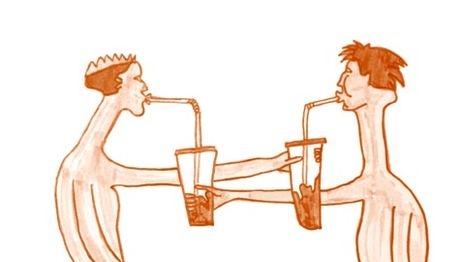The IBSOSE epidemic: Do I need to be quarantined?
Jude Browning muses over the soft addictiveness of the ludicrous Iced Brown Sugar Oat Milk Shaken Espresso

In March 2021, Starbucks introduced the Iced Brown Sugar Oat Milk Shaken Espresso (IBSOSE) to its rotunda of available coffee, and it has remained there ever since – a popular staple of its menu and a tasty little vice for me. The simple recipe of bitter coffee, oat milk, ice and four pumps of brown sugar syrup encapsulates the Starbucks brand’s penchant for sweet, delicious but decidedly unpretentious coffee.
The coffee itself is sweet but refreshingly so, with a flavour akin to marzipan. Due to the ingredients being shaken the brown sugar syrup is distributed perfectly through the drink, rather than sinking to a watery grave as so many inferior coffees are fated. For those who like their coffee to taste of, well, coffee, leaving the ice to melt slightly can take the edge off of the syrup. The velvety and nutty taste of the oat milk really complements that of the brown sugar, alongside a very faint flavour of cinnamon. There is a real pleasing sensory quality to the sound of the ice clinking together as it shakes about.
The IBSOSE has become my drink of choice whenever I am enticed by the faint green glow of the Starbucks mermaid. In fact, I have increasingly found myself craving the drink whenever I feel a thirst for sugar on my sullen trod back to College. This has been a surprising revelation in my appetite. Previously, I had found myself able to resist forming a caffeine addiction at Cambridge, reserving coffee for those mornings when my bed’s magnetic pull produced one-too-many ‘five more minutes.’ Sometimes I even purchased a decaffeinated version. Instead of caffeine, what I have found myself craving is the sugar.
The IBSOSE has become my drink of choice whenever I am enticed by the faint green glow of the Starbucks mermaid.
Sugar has become an increasingly irreplaceable part of the British diet; in college canteens you will find it not only in desserts but in pasta sauces and white bread, added as a cheap flavouring. It is estimated that the problem is especially acute for young adults, with our age group consuming on average more than double the recommended sugar intake. Recent scientific studies have also warned that society has vilified fat intake while ignoring the impact of sugar on our health.
Throughout my university experience I have increasingly found myself having more intense sugar cravings. A ‘liking’ to sweet food is often downplayed as having a ‘sweet tooth,’ ignoring the very real and addictive nature of sugar. Sugar cravings are rooted in our brain chemistry and evolutionary history. The consumption of sugar triggers the release of dopamine, the “feel-good” chemical in the brain. This reward system dates back to our evolutionary history when seeking out calorie-rich, sweet foods ensured survival. Today, our brains still respond positively to sugar’s dopamine release, driving us to indulge in sugary treats repeatedly. I have found that once I give into these sugar cravings, they will return far stronger the next day. Perhaps it is no coincidence that, at Cambridge, my cravings have grown. Research has shown that stress and prolonged periods of mental activity make the body yearn for sugar.
Stress and prolonged periods of mental activity make the body yearn for sugar.
The sugar-rush from four pumps of syrup has not been the only cause of my addiction. Drinking coffee has become a communal affair. I am part of a group chat with four of my friends where we share our love for the drink, making the others aware when we have acquired an IBSOSE. It is perhaps the culmination of coffee’s transformation from a convenient source of energy towards an experience or lifestyle, an event to be shared. If I have developed a coffee and sugar addiction, then the group chat should be considered the opposite of a recovery group. One member said that they “truly cannot put into words what the IBSOSE does to my taste buds and soul.” They further admitted that they have missed trains before due to prioritising getting one, even though the price was admittedly “stonking.” Another who works at Starbucks has also said she has noticed that there are certain customers who love the drink and admit they ache for it.
It’s a ritual, a shared language among friends, and a sweet rebellion against the oppressive workload of Cambridge.
I have tried to resist its allure and forgo my coffee, but let’s face it, boring water doesn’t compare to the symphony of taste that is the IBSOSE. It’s more than a drink; it’s a ritual, a shared language among friends, and a sweet rebellion against the oppressive workload of Cambridge. So, as I sip my way through the complexities of life, the IBSOSE remains my delightful vice – a lot of sugar and a lot more joy.
 News / Cambridge bus strikes continue into new year16 January 2026
News / Cambridge bus strikes continue into new year16 January 2026 News / Uni members slam ‘totalitarian’ recommendation to stop vet course 15 January 2026
News / Uni members slam ‘totalitarian’ recommendation to stop vet course 15 January 2026 Science / Why smart students keep failing to quit smoking15 January 2026
Science / Why smart students keep failing to quit smoking15 January 2026 Interviews / The Cambridge Cupid: what’s the secret to a great date?14 January 2026
Interviews / The Cambridge Cupid: what’s the secret to a great date?14 January 2026 Comment / Will the town and gown divide ever truly be resolved?12 January 2026
Comment / Will the town and gown divide ever truly be resolved?12 January 2026









